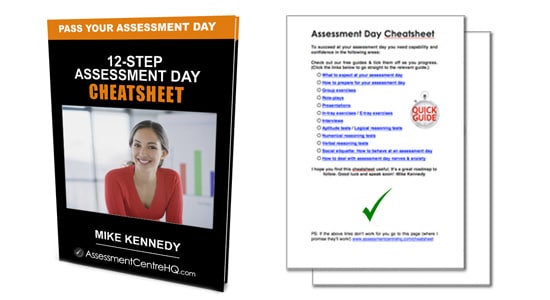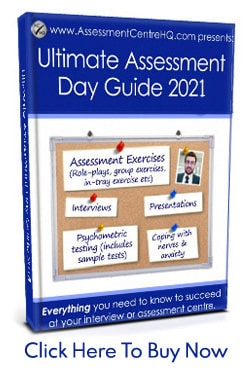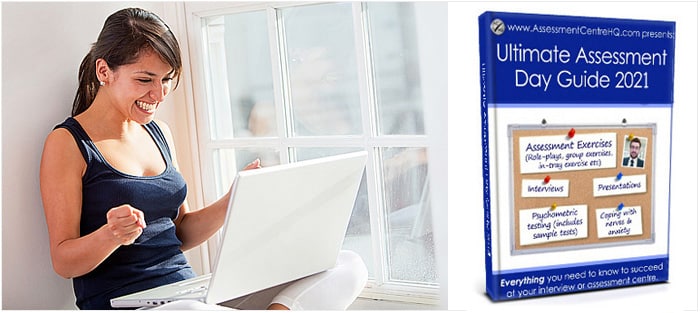Unlocking Verbal Reasoning Tests: Strategies & Practice Tips
Download our Ultimate Assessment Day & Interview Guide 2022 here. (It's packed with tips, tricks and insider-secrets to help you succeed.)
Welcome to our complete guide on verbal reasoning tests! You’ll find tons of useful resources, practice tests & essential tips here. Let’s get started!
2 Useful Resources to Help You Start
1) Get hold of our recommended verbal practice tests here. (These contain high-quality and industry-standard practice questions with clear explanations for each correct answer.)
2) Download your 4-Step Verbal Reasoning Cheatsheet.
This is one of our most popular articles as the verbal reasoning test is one of the assessment activities that candidates really worry about before their interview assessment centre.
But never fear, as always we’ll give you a complete guide with the necessary tools and helpful advice you need to succeed in any verbal reasoning assessment.
Of course, we need to quickly cover the basics before looking in detail at how to pass a verbal reasoning test. Check out the verbal reasoning test overview below.

What Is a Verbal Reasoning Test?
A verbal reasoning test is a form of psychometric aptitude testing that is widely used by corporate employers in an interview and assessment centre.
What Is Measured by a Verbal Reasoning Test?
Verbal reasoning tests measure English language skills, but these tests also give employers insight into the overall intelligence, judgement, and business acumen of the test takers.
Also Check:
What Should I Expect During a Verbal Reasoning Test?
Unlike in a psymetric test, wherein you will encounter games, in a verbal reasoning test, you are usually provided with a written passage. Usually, it is just a short passage that you are required to read and analyze. Using only the information provided, you need to evaluate the passage and answer questions by choosing from the choices below.
True (The statement logically follows the written information)
False (The statement is logically false based on the written information)
Cannot Say (One cannot determine whether the statement is true or false without further information)
Are All Verbal Reasoning Tests the Same?
No. Verbal reasoning tests all assess very similar criteria, but there are variations in the tests themselves.
Find out beforehand who created (SHL, Saville, Talent Q, Kenexa, ACER etc) the verbal reasoning test you will take. Then, try to answer questions from practice verbal reasoning tests created by the test provider.
Your prospective employer’s HR department, or the agency who is representing you will be able to give you this information. (Don’t feel ‘pushy’ for requesting this, it’s a fair and reasonable question for you to pose!)
- SHL – Verbal reasoning practice tests
- Saville – Verbal reasoning practice tests
- Talent Q – Verbal reasoning practice tests
- Kenexa – Verbal reasoning practice tests
- Cubiks – Verbal reasoning practice tests
- Cut-E – Verbal reasoning practice tests

Can You Show Me Verbal Reasoning Test Example Questions?
Here are verbal reasoning questions like that from a real test. Candidates are required to first read the passage and then choose an answer for each statement. The options for the verbal reasoning questions are the following: True, False, or Cannot say.
Here’s the example passage, the practice questions will follow shortly:
“Many organisations find it beneficial to employ students over the summer. Permanent staff often wish to take their own holidays over this period.
Furthermore, it is not uncommon for companies to experience peak workloads in the summer and so require extra staff.
Summer employment also attracts students who may return as well qualified recruits to an organisation when they have completed their education.
Ensuring that the students learn as much as possible about the organisation encourages interest in working on a permanent basis.
Organisations pay students on a fixed rate without the usual entitlement to paid holidays or sick leave.”
Here are the example questions:
Statement 1
“It is possible that permanent staff who are on holiday can have their work carried out by students.“This statement is ____________.
1) True (The statement follows logically from the information in the passage)
2) False (The statement is logically false from the information in the passage)
3) Cannot Say (Cannot determine whether the statement is true or false without further information)
.
Stop worrying! Download a 12-step assessment day cheatsheet & be perfectly prepared.
Click here to download your copy

.
Statement 2
“Students in summer employment are given the same paid holiday benefit as permanent staff.” This statement is ____________.
1) True (The statement follows logically from the information in the passage)
2) False (The statement is logically false from the information in the passage)
3) Cannot Say (Cannot determine whether the statement is true or false without further information)
Join JobTestPrep Premium - #1 Practice Assessments
Statement 3
“Students are subject to the organisation’s standard disciplinary and grievance procedures.” This statement is ____________.
1) True (The statement follows logically from the information in the passage)
2) False (The statement is logically false from the information in the passage)
3) Cannot Say (Cannot determine whether the statement is true or false without further information)
Statement 4
“Some companies have more work to do in the summer when students are available for vacation work.” This statement is ____________.
1) True (The statement follows logically from the information in the passage)
2) False (The statement is logically false from the information in the passage)
3) Cannot Say (Cannot determine whether the statement is true or false without further information)
More Practice Verbal Reasoning Tests
Here’s a handy list of supplier-specific tests:
- SHL – Verbal reasoning practice tests
- Saville – Verbal reasoning practice tests
- Talent Q – Verbal reasoning practice tests
- Kenexa – Verbal reasoning practice tests
- Cubiks – Verbal reasoning practice tests
- Cut-E – Verbal reasoning practice tests
(These are our recommended verbal reasoning practice tests because they are supplier-specific and contain excellent explanations and scoring reports.)
Don’t Forget to Check This Out…
Download your copy of our popular free report: The 4-Step Verbal Reasoning Cheatsheet.
Can I Take a Full Verbal Reasoning Test Now?
Absolutely, but before you start take the real tests bear the following points in mind as they will significantly improve your average score and separate yourself from other test takers.

6 Expert Tips For Verbal Reasoning Test Success
1) Read the Statement 2-3 Times
It is absolutely vital that you fully understand the statement before you can answer the verbal reasoning questions correctly. Remember that these passages are deliberately written in a way that will trick you. If you make assumptions, this might result affect the number of questions you answered correctly.
So, read, reread, and read it again. However, also keep in mind that there is a time limit, so speed reading is essential.
2) If You’re Stuck Try Starting at the End of the Sentence
A great way to unravel a confusing piece of writing is to start at the end of the sentence and work backward. For long statements that make contradictory points and circular references, this can be very useful in ‘decoding’ their meaning.
Of course, verbal comprehension is essential when taking a verbal reasoning test. To improve your reading comprehension s
3) Stay Calm
Nothing will damage your performance more than losing your focus during the test. Verbal reasoning tests have a time limit, and some people find the timed conditions to be stressful, which can affect their performance.
Additionally, verbal tests that require you to undergo an unstructured interview can also cause immense stress. Your general ability to manage stress and overcome these challenging parts of a verbal test is crucial if you want to get through an application process.
So, if you want to do well in verbal reasoning tests, you can check out two articles that help can help you manage stress:
How To Prepare For An Interview Or Assessment Centre: The Ultimate Guide
How To Deal With Nerves & Anxiety At Your Interview Or Assessment Centre
4) Practice as Much as Possible Before Your Real Test
There are two things that will help to answer verbal reasoning tests with flying colors: follow expert advice and take practice verbal reasoning tests. Familiarity with the test format will not only improve your verbal ability and reasoning ability, but it will also help you relax and prepare for the real test.
PRO TIP: You can practise verbal reasoning tests used by employers here. (These tests aren’t free, but they are a must for candidates who want to do absolutely everything to guarantee success.)
Buy practice verbal reasoning books from Amazon to brush up on your grammar and verbal reasoning skills, you can find a good selection to get you starte here.
Listen to our podcast on verbal reasoning test success, you can find it here.
5) Manage Your Time Carefully
Most verbal reasoning tests last for around 20 minutes. As with most assessment centre activities it’s vital that you manage your time carefully.
You should always scan ahead and see how many questions relate to the statement you’re about to read, it will help you gauge how much time to allocate.
PRO TIP: As a rough rule of thumb, you should spend about 1 minute on each question. If you are really stuck on a question don’t waste time trying to figure it out. During the 5 minutes you spend pondering one tricky question you could correctly answer 5 others.
6) Make No Assumptions
Don’t factor in real-life intelligence that you know proves or disproves a statement. You might have prior knowledge about the written information, but you should only consider what is actually provided. You absolutely must take the test literally – if it isn’t included in the passage then you can’t include it when trying to make logical conclusions to answer the test questions.

Remember the Golden Rule: Find Out Who Makes Your Verbal Reasoning Test & Use the Practice Tests Made by Them:
- Practice SHL verbal reasoning tests here
- Practice Saville verbal reasoning tests here
- Practice Talent-Q verbal reasoning tests here
- Practice Kenexa verbal reasoning tests here
- Practice Cubiks verbal reasoning tests here
- Practice Cut-E verbal reasoning tests here
Two Good Verbal Reasoning Test Books
1) “You’re Hired! Psychometric Tests: Proven tactics to help you pass”
Alan Redman’s book is a good resource for candidates who are particularly worried about their verbal reasoning tests or those who have struggled in their practice tests. This book will help you improve your skill level. With sufficient effort, you improve your verbal ability and probably find yourself having strong verbal skills. You can find the book on verbal reasoning assessments here: Amazon (UK) | Amazon (USA)
2) “Practice & Pass: Verbal Reasoning”
I often recommend Alan Redman’s book to candidates who are particularly worried about their verbal reasoning tests or those who have struggled in their practice tests. You can find it here: Amazon (UK) | Amazon (USA)
‘Ok, I’m Ready to Try a Practice Verbal Reasoning Test!’
Great, let’s do it! Before taking this practice verbal reasoning test, try to calm your nerves, drink water, and clear your head for five minutes. This sample verbal reasoning test has a 15-minute time limit. Ensure that you’re free from distraction, so you can focus wholly on the test and get an accurate result.
But remember, for maximum benefit you should practice verbal reasoning tests from the same supplier your prospective employer uses.
The 4-Steps To Verbal Reasoning Success
Download your copy of our popular free report: The 4-Step Verbal Reasoning Cheatsheet.
Some Final Questions for You…
- Do you have to take a numerical reasoning test or a verbal reasoning test? If so you may want to check out the aptitude tests section of the site.
- You can find practice tests and tons of free advice on every other type of ‘reasoning test’ too: numerical, verbal, abstract, logical, inductive, diagrammatic, spatial, mechanical comprehension, UKCAT , Wonderlic Cognitive Ability, and Watson-Glaser tests.
- Worried about your assessment day? Maybe you’re worried about performing a presentation or preparing for an interview or group exercise or in-tray exercise?
- Perhaps you’d like some guidance on how to deal with nerves & anxiety at your interview?
- Lastly the Tools and Resources page is packed with useful equipment and ‘A’ List recommendations that will make your life easier.
- You can listen to our podcast on verbal reasoning here.
Turbocharge your employability NOW
Get your copy of our Ultimate Assessment Day & Interview Guide here. It's packed with tips, tricks and insider-secrets to help you succeed.
.
© Copyright AssessmentCentreHQ - All Rights Reserved
.
Also Read:
- European Investment Bank Study Guide
- Maersk PLI Assessment: Ultimate Study Guide
- Cut-E AON Assessment: A Complete Preparation Guide
- How to Pass GSK Test? Success Guide
- The LNAT Practice Test – Everything You need to Know
- SHL Aptitude Test – Complete Test Preparation Guide
- Elenchus Test – Complete Preparation Guide
- Engineering Aptitude Test – Study Guide







